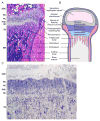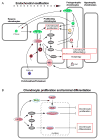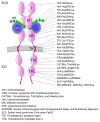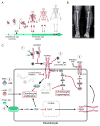Achondroplasia: Development, pathogenesis, and therapy
- PMID: 27987249
- PMCID: PMC5354942
- DOI: 10.1002/dvdy.24479
Achondroplasia: Development, pathogenesis, and therapy
Abstract
Autosomal dominant mutations in fibroblast growth factor receptor 3 (FGFR3) cause achondroplasia (Ach), the most common form of dwarfism in humans, and related chondrodysplasia syndromes that include hypochondroplasia (Hch), severe achondroplasia with developmental delay and acanthosis nigricans (SADDAN), and thanatophoric dysplasia (TD). FGFR3 is expressed in chondrocytes and mature osteoblasts where it functions to regulate bone growth. Analysis of the mutations in FGFR3 revealed increased signaling through a combination of mechanisms that include stabilization of the receptor, enhanced dimerization, and enhanced tyrosine kinase activity. Paradoxically, increased FGFR3 signaling profoundly suppresses proliferation and maturation of growth plate chondrocytes resulting in decreased growth plate size, reduced trabecular bone volume, and resulting decreased bone elongation. In this review, we discuss the molecular mechanisms that regulate growth plate chondrocytes, the pathogenesis of Ach, and therapeutic approaches that are being evaluated to improve endochondral bone growth in people with Ach and related conditions. Developmental Dynamics 246:291-309, 2017. © 2016 Wiley Periodicals, Inc.
Keywords: FGF; FGFR3; achondroplasia; chondrogenesis; endochondral ossification; fibroblast growth factor receptor; growth plate; hypochondroplasia; skeletal dysplasia; thanatophoric dysplasia; therapy.
© 2016 Wiley Periodicals, Inc.
Figures





References
-
- Aikawa T, Segre GV, Lee K. Fibroblast growth factor inhibits chondrocytic growth through induction of p21 and subsequent inactivation of cyclin E-Cdk2. J Biol Chem. 2001;276:29347–29352. - PubMed
-
- Barnard JC, Williams AJ, Rabier B, Chassande O, Samarut J, Cheng SY, Bassett JH, Williams GR. Thyroid hormones regulate fibroblast growth factor receptor signaling during chondrogenesis. Endocrinology. 2005;146:5568–5580. - PubMed
-
- Bartels CF, Bukulmez H, Padayatti P, Rhee DK, van Ravenswaaij-Arts C, Pauli RM, Mundlos S, Chitayat D, Shih LY, Al-Gazali LI, Kant S, Cole T, Morton J, Cormier-Daire V, Faivre L, Lees M, Kirk J, Mortier GR, Leroy J, Zabel B, Kim CA, Crow Y, Braverman NE, van den Akker F, Warman ML. Mutations in the transmembrane natriuretic peptide receptor NPR-B impair skeletal growth and cause acromesomelic dysplasia, type Maroteaux. Am J Hum Genet. 2004;75:27–34. - PMC - PubMed
Publication types
MeSH terms
Substances
Grants and funding
LinkOut - more resources
Full Text Sources
Other Literature Sources

